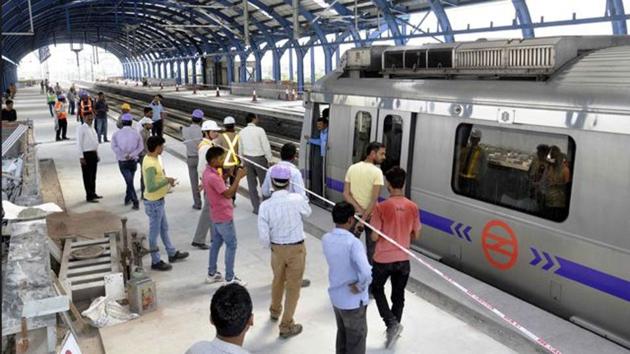Lok Sabha elections 2019: In election season, politics rides Metro in Delhi
Being debated in the cool confines of the Metro are an array of issues such as the Pulwama attack, the Rafale deal, Goods and Services Tax, demonetisation, sealing drive, the chances of political parties and post-poll permutations and combinations.
A young couple’s difference of opinion over the state of affairs of Indian politics escalates quick and loud, enough to draw the attention of their co-passengers in a Metro train. The woman had just endorsed an action of the ruling government, much to the annoyance of her male friend. The conversation gets heated, and soon, the woman gets up and, in a huff, hops off the train at Hauz Khas Metro station — just as the train’s doors begin to shut. The upset friend, however, does not deboard at the next station to follow her — unlike in movies. Instead, he decides to carry on with his journey.

“You must discuss politics with us, not your girlfriend,” a fellow passenger offers unsolicited advice.
Welcome to the new normal in Delhi Metro, which serves more than 2.5 million passengers from various walks of life daily. Being debated in the cool confines of the Metro are an array of issues such as the Pulwama attack, the Rafale deal, Goods and Services Tax, demonetisation, sealing drive, the chances of political parties and post-poll permutations and combinations. The nature of the debates and the subjects of discussions vary from one Metro line to another, reflecting the diversity of opinions and aspirations of people from different parts of the Capital — a city that loves its politics.
“Metro passengers have leisure time. They are likely to patiently listen to logic,” Ranjeet Gopal, owner of a travel agency, says amid his attempts to convince his co-passengers “not to waste their vote”. “Metro fares have nearly doubled recently. I’ve been trying to explain to my co-passengers the connection between politics, economy and their impact on our everyday lives,” he says.
Are these conversations getting more polarised and aggressive than a few years ago? Sociologist Dipankar Gupta believes this tendency has been there for years, but manifests itself mainly during the election season.
“For several years now, there is more emphasis on leadership during the election season, which prompts voters to think in a blanket term of “yes” or “no”. So, it is natural that voters take sides during conversations in the election season. Instead of evaluating the political performance of the ruling party and of the opposition throughout the entire term, these days, the performance of ruling parties and the opposition is done once every five years, where personality assessment wins as there is little time for reasoned debates. This encourages the use of strong language,” Gupta said.
If a large number of political hoardings at Metro stations and inside the train compartment are anything to go by, political parties seem to believe that the Metro is a perfect vehicle to take their messages to voters. In fact, some candidates such as Parvesh Sahib Singh, Meenakshi Lekhi and Harsh Vardhan have already taken Metro rides as part of their campaign.
BJP’s Chandni Chowk candidate, Harsh Vardhan, said he chose the Metro because he “developed an emotional connection” with it since he was a part of the team that conceived the idea of the creation of the Delhi Metro in 1994.
“The metro carries lakhs of passengers every day. One can see the real city, as all sections of society travel in it. Even as an MLA, I would take the metro from Preet Vihar to Dwarka to visit my relatives. I realised how easy it was to develop connect with co-passengers”.
The conversations between Metro passengers are also reflective of their constituencies. As a Metro train passes through Shastri Park in east Delhi, a large political hoarding at a distance outside triggers a debate. “The party talks of cleanliness, but look at the garbage on the road,” says Nasir Khan, a garments trader. “If you want to know how badly maintained a neighbourhood is, you should travel by Metro and look out the window,” his friend, Aslam Haque, adds.
The Kashmere Gate Metro station serves as a place for study for a host of university students. One of them, Sanchit Chaudhary, an engineering student, who has recently been placed with a private firm, says India’s security, and not employment, is the real issue. His friend reminds him of the hike in Metro fare but he does not change his opinion. “I can pay a little extra for the country’s security,” he replies.
Meanwhile, a bookstore in the Vishwavidyalaya Metro station premises has seen little activity despite stocking up a host of books on elections, democracy, constitution and Parliament, keeping the upcoming elections in mind.
“Fewer students purchase books nowadays. If at all, they prefer romantic novels,” says Piyush Kumar, the 25-year-old manager of the bookstore run by the National Book Trust.
Education is a recurring debate, irrespective of which Metro line you are travelling on. Advocating the need for quality education are mostly government teachers, who will also serve as polling officers. Many of them take the Metro for election training. “I have been seeing first-hand how politics changes the standard of education in Delhi. I usually avoid debates, but get in whenever I hear a political debate in Metro,” says Shabana, a government school teacher. “I just want to share what’s on my mind because I understand the education system,” Shabana says.



